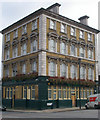1
Redundant Church
Used to be St Francis of Assisi
Image: © John Salmon
Taken: 9 May 2011
0.03 miles
2
The Lamb Public House, North Road, Islington
One of four Italianate gin palaces built to serve the Caledonian Cattle Market. This one is at the corner of North Road and Shearling Way, and is currently unoccupied.
Image: © Jim Osley
Taken: 23 Feb 2009
0.06 miles
3
Islington : Caledonian Tower
Grade II* listed former clock tower of Caledonian Market tower. 1855. Architect: James Bunstone Bunning.
Image: © Jim Osley
Taken: 8 Oct 2020
0.06 miles
4
Flowerbed in Caledonian Park
Image: © Paul Gillett
Taken: 6 Sep 2014
0.06 miles
5
Market Clock Tower, Caledonian Park, Islington
The last reminder of the Metropolitan Cattle and Meat Market. The Baroque influenced clock tower was built in the 1850s to the designs of J.B. Bunning, architect to the Corporation of the City of London.
Image: © Jim Osley
Taken: 23 Feb 2009
0.06 miles
6
Clock Tower, Caledonian Park
Grade II* listed clock tower built to the designs of architect John Bunstone Bunning. The clock tower is the only surviving structure of the Metropolitan Cattle Market which operated from 1855 to 1963, latterly as a bric-a-brac market after the trade in livestock ceased.
Image: © Jim Osley
Taken: 17 Apr 2016
0.06 miles
7
Clock tower in Caledonian Park, near Holloway
Caledonian Park occupies part of the site of a Victorian cattle market, with housing on the rest of the site. The clock tower, which was at the centre of the market, survives. The clock tower is Grade II* listed.
Image: © Malc McDonald
Taken: 26 Jan 2019
0.06 miles
8
The Clock Tower in Caledonian Park
The Caledonian Park Clock Tower was built as the centre piece to the Metropolitan Cattle Market which opened in 1855 to replace Smithfield as London's main livestock market. The tower was designed to act as a focal point for drovers entering London. Prior to that, it was known as Copenhagen Fields. On 21st April 1834, 100,000 people gathered here in support of the Tolpuddle martyrs. The cattle market closed in 1939. The original railings of the cattle market can still be seen - https://www.geograph.org.uk/photo/7015996 The sale of meat ended in the 1960s. The market buildings were then mostly demolished, council housing, principally the Market Estate, was built over much of the site, and the remainder converted to Caledonian Park.
A very full and interesting history can be seen at https://alondoninheritance.com/london-monuments/caledonian-park-history-murals-and-a-fire/
Image: © Marathon
Taken: 9 Nov 2021
0.06 miles
9
The Caledonian Park Clock Tower
The Caledonian Park Clock Tower was built as the centre piece to the Metropolitan Cattle Market which opened in 1855 to replace Smithfield as London's main livestock market. The tower was designed to act as a focal point for drovers entering London. Prior to that, it was known as Copenhagen Fields. On 21st April 1834, 100,000 people gathered here in support of the Tolpuddle martyrs. The cattle market closed in 1939. The original railings of the cattle market can still be seen - https://www.geograph.org.uk/photo/7015996 The sale of meat ended in the 1960s. The market buildings were then mostly demolished, council housing, principally the Market Estate, was built over much of the site, and the remainder converted to Caledonian Park. See also https://www.geograph.org.uk/photo/7015823
A very full and interesting history can be seen at https://alondoninheritance.com/london-monuments/caledonian-park-history-murals-and-a-fire/
Image: © Marathon
Taken: 9 Nov 2021
0.06 miles
10
Redundant church
Image: © John Salmon
Taken: 9 May 2011
0.07 miles











